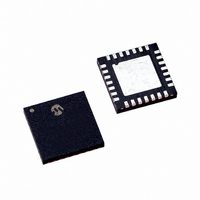PIC16LF1827-I/ML Microchip Technology, PIC16LF1827-I/ML Datasheet - Page 123

PIC16LF1827-I/ML
Manufacturer Part Number
PIC16LF1827-I/ML
Description
IC, 8BIT MCU, PIC16LF, 32MHZ, QFN-28
Manufacturer
Microchip Technology
Series
PIC® XLP™ 16Fr
Specifications of PIC16LF1827-I/ML
Controller Family/series
PIC16LF
Eeprom Memory Size
256Byte
Ram Memory Size
384Byte
Cpu Speed
32MHz
No. Of Timers
5
Interface
EUSART, I2C, SPI
Core Size
8 Bit
Program Memory Size
4kWords
Core Processor
PIC
Speed
32MHz
Connectivity
I²C, SPI, UART/USART
Peripherals
Brown-out Detect/Reset, POR, PWM, WDT
Number Of I /o
16
Program Memory Type
FLASH
Eeprom Size
256 x 8
Ram Size
384 x 8
Voltage - Supply (vcc/vdd)
1.8 V ~ 3.6 V
Data Converters
A/D 12x10b
Oscillator Type
Internal
Operating Temperature
-40°C ~ 85°C
Package / Case
28-VQFN Exposed Pad, 28-HVQFN, 28-SQFN, 28-DHVQFN
Processor Series
PIC16LF
Core
PIC
Data Bus Width
8 bit
Data Ram Size
256 B
Interface Type
I2C, SPI, UART
Maximum Clock Frequency
32 KHz
Number Of Programmable I/os
16
Number Of Timers
5
Operating Supply Voltage
1.8 V to 3.6 V
Maximum Operating Temperature
+ 125 C
Mounting Style
SMD/SMT
3rd Party Development Tools
52715-96, 52716-328, 52717-734
Development Tools By Supplier
PG164130, DV164035, DV244005, DV164005
Minimum Operating Temperature
- 40 C
On-chip Adc
10 bit, 12 Channel
On-chip Dac
5 bit
Lead Free Status / RoHS Status
Lead free / RoHS Compliant
Lead Free Status / RoHS Status
Lead free / RoHS Compliant, Lead free / RoHS Compliant
- Current page: 123 of 406
- Download datasheet (4Mb)
12.2
PORTA is a 8-bit wide, bidirectional port. The
corresponding data direction register is TRISA
(Register 12-4). Setting a TRISA bit (= 1) will make the
corresponding PORTA pin an input (i.e., disable the
output driver). Clearing a TRISA bit (= 0) will make the
corresponding PORTA pin an output (i.e., enables
output driver and puts the contents of the output latch
on the selected pin). The exception is RA5, which is
input only and its TRIS bit will always read as ‘1’.
Example 12-1 shows how to initialize PORTA.
Reading the PORTA register (Register 12-3) reads the
status of the pins, whereas writing to it will write to the
PORT latch. All write operations are read-modify-write
operations. Therefore, a write to a port implies that the
port pins are read, this value is modified and then
written to the PORT data latch (LATA).
The TRISA register (Register 12-4) controls the
PORTA pin output drivers, even when they are being
used as analog inputs. The user should ensure the bits
in the TRISA register are maintained set when using
them as analog inputs. I/O pins configured as analog
input always read ‘0’.
EXAMPLE 12-1:
12.2.1
Each of the PORTA pins has an individually configurable
internal weak pull-up. Control bit WPUA<5> enables or
disables the pull-up (see Register 12-6). The weak
pull-up is automatically turned off when the port pin is
configured as an output. The pull-up is disabled on a
Power-on Reset by the WPUEN bit of the OPTION
register.
2010 Microchip Technology Inc.
BANKSEL PORTA
CLRF
BANKSEL LATA
CLRF
BANKSEL ANSELA
CLRF
BANKSEL TRISA
MOVLW
MOVWF
Note:
PORTA Registers
PORTA
LATA
ANSELA
0Ch
TRISA
The ANSELA register must be initialized to
configure an analog channel as a digital
input. Pins configured as analog inputs will
read ‘0’.
WEAK PULL-UPS
INITIALIZING PORTA
;
;Init PORTA
;Data Latch
;
;
;digital I/O
;
;Set RA<3:2> as inputs
;and set RA<7:4,1:0>
;as outputs
Preliminary
12.2.2
The ANSELA register (Register 12-7) is used to
configure the Input mode of an I/O pin to analog.
Setting the appropriate ANSELA bit high will cause all
digital reads on the pin to be read as ‘0’ and allow
analog functions on the pin to operate correctly.
The state of the ANSELA bits has no affect on digital
output functions. A pin with TRIS clear and ANSEL set
will still operate as a digital output, but the Input mode
will be analog. This can cause unexpected behavior
when executing read-modify-write instructions on the
affected port.
The TRISA register (Register 12-4) controls the PORTA
pin output drivers, even when they are being used as
analog inputs. The user should ensure the bits in the
TRISA register are maintained set when using them as
analog inputs. I/O pins configured as analog input always
read ‘0’.
Note:
PIC16F/LF1826/27
ANSELA REGISTER
The ANSELA register must be initialized to
configure an analog channel as a digital
input. Pins configured as analog inputs will
read ‘0’.
DS41391C-page 123
Related parts for PIC16LF1827-I/ML
Image
Part Number
Description
Manufacturer
Datasheet
Request
R

Part Number:
Description:
IC, 8BIT MCU, PIC16LF, 32MHZ, QFN-28
Manufacturer:
Microchip Technology
Datasheet:

Part Number:
Description:
IC, 8BIT MCU, PIC16LF, 32MHZ, DIP-18
Manufacturer:
Microchip Technology
Datasheet:

Part Number:
Description:
IC, 8BIT MCU, PIC16LF, 20MHZ, TQFP-44
Manufacturer:
Microchip Technology
Datasheet:

Part Number:
Description:
7 KB Flash, 384 Bytes RAM, 32 MHz Int. Osc, 16 I/0, Enhanced Mid Range Core, Nan
Manufacturer:
Microchip Technology

Part Number:
Description:
14KB Flash, 512B RAM, LCD, 11x10b ADC, EUSART, NanoWatt XLP 28 SOIC .300in T/R
Manufacturer:
Microchip Technology
Datasheet:

Part Number:
Description:
14KB Flash, 512B RAM, LCD, 11x10b ADC, EUSART, NanoWatt XLP 28 SSOP .209in T/R
Manufacturer:
Microchip Technology
Datasheet:

Part Number:
Description:
MCU PIC 14KB FLASH XLP 28-SSOP
Manufacturer:
Microchip Technology

Part Number:
Description:
MCU PIC 14KB FLASH XLP 28-SOIC
Manufacturer:
Microchip Technology

Part Number:
Description:
MCU PIC 512B FLASH XLP 28-UQFN
Manufacturer:
Microchip Technology

Part Number:
Description:
MCU PIC 14KB FLASH XLP 28-SPDIP
Manufacturer:
Microchip Technology

Part Number:
Description:
MCU 7KB FLASH 256B RAM 40-UQFN
Manufacturer:
Microchip Technology

Part Number:
Description:
MCU 7KB FLASH 256B RAM 44-TQFP
Manufacturer:
Microchip Technology

Part Number:
Description:
MCU 14KB FLASH 1KB RAM 28-UQFN
Manufacturer:
Microchip Technology

Part Number:
Description:
MCU PIC 14KB FLASH XLP 40-UQFN
Manufacturer:
Microchip Technology

Part Number:
Description:
MCU PIC 14KB FLASH XLP 44-TQFP
Manufacturer:
Microchip Technology










